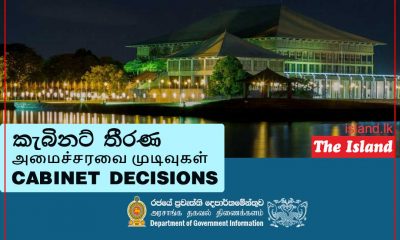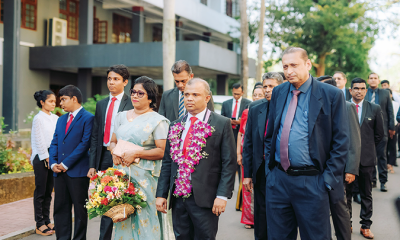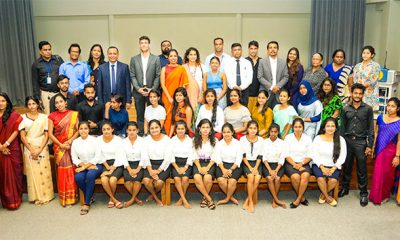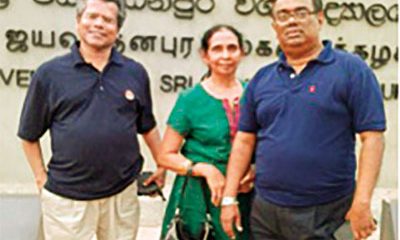Features
Only Connect
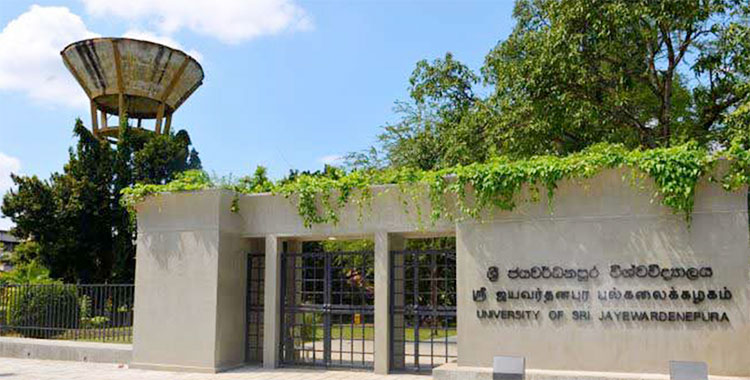
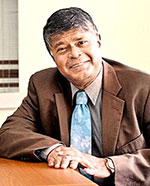 Text of a speech
Text of a speech
delivered by
Prof. Rajiva Wijesinha
recently at the Web Page Launch of the ‘English for Fun’ Project, an outreach service of the Library, University of Sri Jayewardenepura
‘Only Connect’ is an exhortation by E M Forster that I have long thought a guideline for productive action. This I believe is what some of you at the University of Sri Jayewardenepura have done, to implement a remarkable initiative.
This is the more remarkable in that it seems to me the first initiative for several years in the field of education which takes forward the guiding principle that led to so many great innovations over almost a century. Beginning with C W W Kannangara’s creation of several schools to provide for students outside the big towns an education to equal that available to a previous charmed circle, and moving on to the effort by Arjuna Aluvihare, the best UGC Chairman we have had; he wanted to broad-base tertiary education; from the efforts to provide tertiary English for rural students and disseminate English medium education more widely through the government system – remembering that Kannangara’s Central Schools functioned in the English medium before the blight of compulsory Swabhasha was introduced by J R Jayewardene – to the effort less than a decade ago to ensure soft skills in vocational training, the focus of creative effort was to extend opportunities, not just for education but also for education leading to productive employment, for those who are comparatively deprived.
None of that has mattered in recent times to decision makers, and we go on with the mixture as before, pouring borrowed money into essentially the same projects, improving the Relevance and Quality of University Education with no appreciable outcome over now a quarter of a century, ploughing money into construction in schools with no systematic efforts to use plant productively, right through the day and right through the year.
Madhu Ratnayake, whose brainchild of English Language Acquisition Centres we celebrate today, has tried to remedy this, and to no small extent I feel, for the concept she has deployed, of English for Fun, making use of existing structures that are under-used – in this case the excellent library system the country has – can be extended to more and more productive learning activities at all levels. This I should note is something, as I suggested when coronavirus first struck us, that the education ministry should have developed, alternative systems of delivering learning, through clusters and user friendly materials that could be deployed outside schools which coronavirus had rendered doubly dangerous, because of difficult travel and then crowded classrooms. But unfortunately, the several Ministers of Education we have had, in the game of musical chairs this country has suffered from for a couple of years, were not interested in or capable of alternative thinking. The result, as your Vice-Chancellor put clearly in his very thoughtful speech, is that fewer and fewer students attend school.
To return to Madhu’s alternative thinking, I should mention that when I headed the Tertiary and Vocational Education Commission, where I introduced a great many initiatives, I found myself running out of steam towards the end of 2017. This was in part because a committed Minister who studied his briefs had been replaced by one who thought a portfolio was simply a vehicle to provide jobs for constituents – a sad function of our electoral system where MPs have to fight each other over whole Districts for votes.
But when I was drooping, it was Madhu who revived me with a plan for the training of potential pre-school teachers, another of the brilliant ideas that, as in the case of the Athenians, she produces once a week from her fertile imagination. I moved on this immediately, but then I was sacked, and the vocational training sector sank into moribundity – and in the process abolished the most popular courses at the time, certificates in English that helped to occupy students in the ghastly fallow period they have after public examinations. Though successive Ministers of Education talk about the need for more and better English, since none of them look at what has been put in place, they allow it to be dismantled even while they witter on.
But Madhu did not rest, when her proposal was forgotten, and earlier this year I put her in touch with someone else full of energy, who when he worked for me would ask me critically what we planned to reform next. This was the Governor of the Northern Province, and working with his indefatigable Coordinating Secretary, Dhanya Ratnavale, Madhu has set up pre-school centres in the North with teachers trained to have fun with students, through the activities which she pioneered here in the English Language Teaching Department.
But the lady never rests, and after that got off the ground, she engendered new ideas, and then found a willing ally in your Librarian, and now we have what promises to be a fantastic opportunity for learning all over the country. This collaboration reminds me of something I proposed soon after I became a Member of Parliament, when I thought it was my business to initiate socially useful activities, before I came to realise that the principal function of MPs was to get themselves re-elected, and that society had nothing to do with their projects for benefits.
But the lady never rests, and after that got off the ground she engendered new ideas, and then found a willing ally in your Librarian, Nayana Wijayasundara, another of the energetic ladies in whom this university now abounds, and now we have what promises to be a fantastic opportunity for learning all over the country. I was struck by her comments this morning that action does not require funding, but rather clear thinking, and what she has proposed exemplifies this. It reminds me too of something I proposed soon after I became a Member of Parliament, when I thought it was my business to initiate socially useful activities, before I came to realise that the principal function of MPs was to get themselves re-elected, and that society had nothing to do with their projects for benefits.
I wanted to set up cultural activity centres in every Division, and indeed I got a wonderful design from Milinda Pathiraja of the University of Moratuwa, a building that could be used for many purposes and also added to by Divisional officials who wanted to do more for those they were supposed to work for. Unfortunately, Cultural Affairs was then in the hands of a Minister who thought in terms of cement rather than people, as most politicians do, for reasons my father put eloquently thirty years ago. In line with that sad fact, this Minister responded when I asked about establishing a National Theatre, on the lines of institutions in India and England that train youngsters and have regular productions, that we had theatres aplenty. What went on in them was of no interest to him, the human resources that we neglect so that the cement remains unused to its full, or even half its potential.
That idea lapsed, as did my suggestion that we set up English classes in every division, free for students after the Ordinary Level Examination, which would also help in making English compulsory for University Entrance. The buildings are there and personnel are available. But those who took over Higher Education from me in 2015 were not concerned with educational needs, as opposed to commandeering vehicles I had tried to get rid of – 14 I was told I could use – and that was the end of innovation in Higher Education.
But if Madhu takes further her philosophy of connecting things together, I believe she could also now introduce this programme to regions through collaboration with the Regional English Support Centres. These are no longer as dynamic taken as a whole as they were when British Council consultant David Woolger ensured productive activity in all of them. But I know there are still some innovative individuals in place, and I have no doubt they can extend this sort of learning though enjoyment into primary classes as well.
Madhu is one of the few people who could make this happen with support from your dedicated English staff. For they too, like her, continue to innovate, most recently I learned in terms of a wonderful idea of your English Department Professor, Chitra Jayatilleka, to record the work of Sri Lankans in the field of English Drama, a genre long neglected by academia. Remembering how English at USJP was looked down on thirty years ago by universities which prided themselves on being able to send their products to Cambridge – one every decade or so – I am immensely proud of how this university has developed, after the then Vice-Chancellor, Prof S B Hettiarachchi, and the then Dean of Arts, the dedicated Mahinda Palihawadana, took up Arjuna Aluvihare’s challenge and spearheaded the process of broadbasing tertiary education, with particular emphasis on English.
I recall how, soon after I joined this university, Arjuna introduced a group of academics from this university to a World Bank delegation as the cutting edge of the university system. But I soon understood what Arjuna meant, when I met the leading lights here of those distant days, Mr Wickramaarachchi who started the first English Medium only Accountancy Course, the wonderful Oranee Jansz whom every department wanted to teach their students English, and who rapidly made sure along with Mohan de Silva (a thoughtful UGC Chairman, stultified by his dull colleagues appointed to it when his able predecessor was unceremoniously dismissed) that your Medical Faculty students were soon on a par with others from other universities, the avuncular Sirisena Thilakaratna who was later UGC Chairman. It is a joy then to be here today to see Madhu and Nayana collaborating so productively backed so solidly, as Madhu has told me, by the hierarchy here. I can only hope that this will be the precursor of much more to benefit those in distant areas who have no access to the learning and the fun that the more fortunate are exposed to.
Features
The heart-friendly health minister

by Dr Gotabhya Ranasinghe
Senior Consultant Cardiologist
National Hospital Sri Lanka
When we sought a meeting with Hon Dr. Ramesh Pathirana, Minister of Health, he graciously cleared his busy schedule to accommodate us. Renowned for his attentive listening and deep understanding, Minister Pathirana is dedicated to advancing the health sector. His openness and transparency exemplify the qualities of an exemplary politician and minister.
Dr. Palitha Mahipala, the current Health Secretary, demonstrates both commendable enthusiasm and unwavering support. This combination of attributes makes him a highly compatible colleague for the esteemed Minister of Health.
Our discussion centered on a project that has been in the works for the past 30 years, one that no other minister had managed to advance.
Minister Pathirana, however, recognized the project’s significance and its potential to revolutionize care for heart patients.
The project involves the construction of a state-of-the-art facility at the premises of the National Hospital Colombo. The project’s location within the premises of the National Hospital underscores its importance and relevance to the healthcare infrastructure of the nation.
This facility will include a cardiology building and a tertiary care center, equipped with the latest technology to handle and treat all types of heart-related conditions and surgeries.
Securing funding was a major milestone for this initiative. Minister Pathirana successfully obtained approval for a $40 billion loan from the Asian Development Bank. With the funding in place, the foundation stone is scheduled to be laid in September this year, and construction will begin in January 2025.
This project guarantees a consistent and uninterrupted supply of stents and related medications for heart patients. As a result, patients will have timely access to essential medical supplies during their treatment and recovery. By securing these critical resources, the project aims to enhance patient outcomes, minimize treatment delays, and maintain the highest standards of cardiac care.
Upon its fruition, this monumental building will serve as a beacon of hope and healing, symbolizing the unwavering dedication to improving patient outcomes and fostering a healthier society.We anticipate a future marked by significant progress and positive outcomes in Sri Lanka’s cardiovascular treatment landscape within the foreseeable timeframe.
Features
A LOVING TRIBUTE TO JESUIT FR. ALOYSIUS PIERIS ON HIS 90th BIRTHDAY

by Fr. Emmanuel Fernando, OMI
Jesuit Fr. Aloysius Pieris (affectionately called Fr. Aloy) celebrated his 90th birthday on April 9, 2024 and I, as the editor of our Oblate Journal, THE MISSIONARY OBLATE had gone to press by that time. Immediately I decided to publish an article, appreciating the untiring selfless services he continues to offer for inter-Faith dialogue, the renewal of the Catholic Church, his concern for the poor and the suffering Sri Lankan masses and to me, the present writer.
It was in 1988, when I was appointed Director of the Oblate Scholastics at Ampitiya by the then Oblate Provincial Fr. Anselm Silva, that I came to know Fr. Aloy more closely. Knowing well his expertise in matters spiritual, theological, Indological and pastoral, and with the collaborative spirit of my companion-formators, our Oblate Scholastics were sent to Tulana, the Research and Encounter Centre, Kelaniya, of which he is the Founder-Director, for ‘exposure-programmes’ on matters spiritual, biblical, theological and pastoral. Some of these dimensions according to my view and that of my companion-formators, were not available at the National Seminary, Ampitiya.
Ever since that time, our Oblate formators/ accompaniers at the Oblate Scholasticate, Ampitiya , have continued to send our Oblate Scholastics to Tulana Centre for deepening their insights and convictions regarding matters needed to serve the people in today’s context. Fr. Aloy also had tried very enthusiastically with the Oblate team headed by Frs. Oswald Firth and Clement Waidyasekara to begin a Theologate, directed by the Religious Congregations in Sri Lanka, for the contextual formation/ accompaniment of their members. It should very well be a desired goal of the Leaders / Provincials of the Religious Congregations.
Besides being a formator/accompanier at the Oblate Scholasticate, I was entrusted also with the task of editing and publishing our Oblate journal, ‘The Missionary Oblate’. To maintain the quality of the journal I continue to depend on Fr. Aloy for his thought-provoking and stimulating articles on Biblical Spirituality, Biblical Theology and Ecclesiology. I am very grateful to him for his generous assistance. Of late, his writings on renewal of the Church, initiated by Pope St. John XX111 and continued by Pope Francis through the Synodal path, published in our Oblate journal, enable our readers to focus their attention also on the needed renewal in the Catholic Church in Sri Lanka. Fr. Aloy appreciated very much the Synodal path adopted by the Jesuit Pope Francis for the renewal of the Church, rooted very much on prayerful discernment. In my Religious and presbyteral life, Fr.Aloy continues to be my spiritual animator / guide and ongoing formator / acccompanier.
Fr. Aloysius Pieris, BA Hons (Lond), LPh (SHC, India), STL (PFT, Naples), PhD (SLU/VC), ThD (Tilburg), D.Ltt (KU), has been one of the eminent Asian theologians well recognized internationally and one who has lectured and held visiting chairs in many universities both in the West and in the East. Many members of Religious Congregations from Asian countries have benefited from his lectures and guidance in the East Asian Pastoral Institute (EAPI) in Manila, Philippines. He had been a Theologian consulted by the Federation of Asian Bishops’ Conferences for many years. During his professorship at the Gregorian University in Rome, he was called to be a member of a special group of advisers on other religions consulted by Pope Paul VI.
Fr. Aloy is the author of more than 30 books and well over 500 Research Papers. Some of his books and articles have been translated and published in several countries. Among those books, one can find the following: 1) The Genesis of an Asian Theology of Liberation (An Autobiographical Excursus on the Art of Theologising in Asia, 2) An Asian Theology of Liberation, 3) Providential Timeliness of Vatican 11 (a long-overdue halt to a scandalous millennium, 4) Give Vatican 11 a chance, 5) Leadership in the Church, 6) Relishing our faith in working for justice (Themes for study and discussion), 7) A Message meant mainly, not exclusively for Jesuits (Background information necessary for helping Francis renew the Church), 8) Lent in Lanka (Reflections and Resolutions, 9) Love meets wisdom (A Christian Experience of Buddhism, 10) Fire and Water 11) God’s Reign for God’s poor, 12) Our Unhiddden Agenda (How we Jesuits work, pray and form our men). He is also the Editor of two journals, Vagdevi, Journal of Religious Reflection and Dialogue, New Series.
Fr. Aloy has a BA in Pali and Sanskrit from the University of London and a Ph.D in Buddhist Philosophy from the University of Sri Lankan, Vidyodaya Campus. On Nov. 23, 2019, he was awarded the prestigious honorary Doctorate of Literature (D.Litt) by the Chancellor of the University of Kelaniya, the Most Venerable Welamitiyawe Dharmakirthi Sri Kusala Dhamma Thera.
Fr. Aloy continues to be a promoter of Gospel values and virtues. Justice as a constitutive dimension of love and social concern for the downtrodden masses are very much noted in his life and work. He had very much appreciated the commitment of the late Fr. Joseph (Joe) Fernando, the National Director of the Social and Economic Centre (SEDEC) for the poor.
In Sri Lanka, a few religious Congregations – the Good Shepherd Sisters, the Christian Brothers, the Marist Brothers and the Oblates – have invited him to animate their members especially during their Provincial Congresses, Chapters and International Conferences. The mainline Christian Churches also have sought his advice and followed his seminars. I, for one, regret very much, that the Sri Lankan authorities of the Catholic Church –today’s Hierarchy—- have not sought Fr.
Aloy’s expertise for the renewal of the Catholic Church in Sri Lanka and thus have not benefited from the immense store of wisdom and insight that he can offer to our local Church while the Sri Lankan bishops who governed the Catholic church in the immediate aftermath of the Second Vatican Council (Edmund Fernando OMI, Anthony de Saram, Leo Nanayakkara OSB, Frank Marcus Fernando, Paul Perera,) visited him and consulted him on many matters. Among the Tamil Bishops, Bishop Rayappu Joseph was keeping close contact with him and Bishop J. Deogupillai hosted him and his team visiting him after the horrible Black July massacre of Tamils.
Features
A fairy tale, success or debacle

Sri Lanka-Singapore Free Trade Agreement
By Gomi Senadhira
senadhiragomi@gmail.com
“You might tell fairy tales, but the progress of a country cannot be achieved through such narratives. A country cannot be developed by making false promises. The country moved backward because of the electoral promises made by political parties throughout time. We have witnessed that the ultimate result of this is the country becoming bankrupt. Unfortunately, many segments of the population have not come to realize this yet.” – President Ranil Wickremesinghe, 2024 Budget speech
Any Sri Lankan would agree with the above words of President Wickremesinghe on the false promises our politicians and officials make and the fairy tales they narrate which bankrupted this country. So, to understand this, let’s look at one such fairy tale with lots of false promises; Ranil Wickremesinghe’s greatest achievement in the area of international trade and investment promotion during the Yahapalana period, Sri Lanka-Singapore Free Trade Agreement (SLSFTA).
It is appropriate and timely to do it now as Finance Minister Wickremesinghe has just presented to parliament a bill on the National Policy on Economic Transformation which includes the establishment of an Office for International Trade and the Sri Lanka Institute of Economics and International Trade.
Was SLSFTA a “Cleverly negotiated Free Trade Agreement” as stated by the (former) Minister of Development Strategies and International Trade Malik Samarawickrama during the Parliamentary Debate on the SLSFTA in July 2018, or a colossal blunder covered up with lies, false promises, and fairy tales? After SLSFTA was signed there were a number of fairy tales published on this agreement by the Ministry of Development Strategies and International, Institute of Policy Studies, and others.
However, for this article, I would like to limit my comments to the speech by Minister Samarawickrama during the Parliamentary Debate, and the two most important areas in the agreement which were covered up with lies, fairy tales, and false promises, namely: revenue loss for Sri Lanka and Investment from Singapore. On the other important area, “Waste products dumping” I do not want to comment here as I have written extensively on the issue.
1. The revenue loss
During the Parliamentary Debate in July 2018, Minister Samarawickrama stated “…. let me reiterate that this FTA with Singapore has been very cleverly negotiated by us…. The liberalisation programme under this FTA has been carefully designed to have the least impact on domestic industry and revenue collection. We have included all revenue sensitive items in the negative list of items which will not be subject to removal of tariff. Therefore, 97.8% revenue from Customs duty is protected. Our tariff liberalisation will take place over a period of 12-15 years! In fact, the revenue earned through tariffs on goods imported from Singapore last year was Rs. 35 billion.
The revenue loss for over the next 15 years due to the FTA is only Rs. 733 million– which when annualised, on average, is just Rs. 51 million. That is just 0.14% per year! So anyone who claims the Singapore FTA causes revenue loss to the Government cannot do basic arithmetic! Mr. Speaker, in conclusion, I call on my fellow members of this House – don’t mislead the public with baseless criticism that is not grounded in facts. Don’t look at petty politics and use these issues for your own political survival.”
I was surprised to read the minister’s speech because an article published in January 2018 in “The Straits Times“, based on information released by the Singaporean Negotiators stated, “…. With the FTA, tariff savings for Singapore exports are estimated to hit $10 million annually“.
As the annual tariff savings (that is the revenue loss for Sri Lanka) calculated by the Singaporean Negotiators, Singaporean $ 10 million (Sri Lankan rupees 1,200 million in 2018) was way above the rupees’ 733 million revenue loss for 15 years estimated by the Sri Lankan negotiators, it was clear to any observer that one of the parties to the agreement had not done the basic arithmetic!
Six years later, according to a report published by “The Morning” newspaper, speaking at the Committee on Public Finance (COPF) on 7th May 2024, Mr Samarawickrama’s chief trade negotiator K.J. Weerasinghehad had admitted “…. that forecasted revenue loss for the Government of Sri Lanka through the Singapore FTA is Rs. 450 million in 2023 and Rs. 1.3 billion in 2024.”
If these numbers are correct, as tariff liberalisation under the SLSFTA has just started, we will pass Rs 2 billion very soon. Then, the question is how Sri Lanka’s trade negotiators made such a colossal blunder. Didn’t they do their basic arithmetic? If they didn’t know how to do basic arithmetic they should have at least done their basic readings. For example, the headline of the article published in The Straits Times in January 2018 was “Singapore, Sri Lanka sign FTA, annual savings of $10m expected”.
Anyway, as Sri Lanka’s chief negotiator reiterated at the COPF meeting that “…. since 99% of the tariffs in Singapore have zero rates of duty, Sri Lanka has agreed on 80% tariff liberalisation over a period of 15 years while expecting Singapore investments to address the imbalance in trade,” let’s turn towards investment.
Investment from Singapore
In July 2018, speaking during the Parliamentary Debate on the FTA this is what Minister Malik Samarawickrama stated on investment from Singapore, “Already, thanks to this FTA, in just the past two-and-a-half months since the agreement came into effect we have received a proposal from Singapore for investment amounting to $ 14.8 billion in an oil refinery for export of petroleum products. In addition, we have proposals for a steel manufacturing plant for exports ($ 1 billion investment), flour milling plant ($ 50 million), sugar refinery ($ 200 million). This adds up to more than $ 16.05 billion in the pipeline on these projects alone.
And all of these projects will create thousands of more jobs for our people. In principle approval has already been granted by the BOI and the investors are awaiting the release of land the environmental approvals to commence the project.
I request the Opposition and those with vested interests to change their narrow-minded thinking and join us to develop our country. We must always look at what is best for the whole community, not just the few who may oppose. We owe it to our people to courageously take decisions that will change their lives for the better.”
According to the media report I quoted earlier, speaking at the Committee on Public Finance (COPF) Chief Negotiator Weerasinghe has admitted that Sri Lanka was not happy with overall Singapore investments that have come in the past few years in return for the trade liberalisation under the Singapore-Sri Lanka Free Trade Agreement. He has added that between 2021 and 2023 the total investment from Singapore had been around $162 million!
What happened to those projects worth $16 billion negotiated, thanks to the SLSFTA, in just the two-and-a-half months after the agreement came into effect and approved by the BOI? I do not know about the steel manufacturing plant for exports ($ 1 billion investment), flour milling plant ($ 50 million) and sugar refinery ($ 200 million).
However, story of the multibillion-dollar investment in the Petroleum Refinery unfolded in a manner that would qualify it as the best fairy tale with false promises presented by our politicians and the officials, prior to 2019 elections.
Though many Sri Lankans got to know, through the media which repeatedly highlighted a plethora of issues surrounding the project and the questionable credentials of the Singaporean investor, the construction work on the Mirrijiwela Oil Refinery along with the cement factory began on the24th of March 2019 with a bang and Minister Ranil Wickremesinghe and his ministers along with the foreign and local dignitaries laid the foundation stones.
That was few months before the 2019 Presidential elections. Inaugurating the construction work Prime Minister Ranil Wickremesinghe said the projects will create thousands of job opportunities in the area and surrounding districts.
The oil refinery, which was to be built over 200 acres of land, with the capacity to refine 200,000 barrels of crude oil per day, was to generate US$7 billion of exports and create 1,500 direct and 3,000 indirect jobs. The construction of the refinery was to be completed in 44 months. Four years later, in August 2023 the Cabinet of Ministers approved the proposal presented by President Ranil Wickremesinghe to cancel the agreement with the investors of the refinery as the project has not been implemented! Can they explain to the country how much money was wasted to produce that fairy tale?
It is obvious that the President, ministers, and officials had made huge blunders and had deliberately misled the public and the parliament on the revenue loss and potential investment from SLSFTA with fairy tales and false promises.
As the president himself said, a country cannot be developed by making false promises or with fairy tales and these false promises and fairy tales had bankrupted the country. “Unfortunately, many segments of the population have not come to realize this yet”.
(The writer, a specialist and an activist on trade and development issues . )


